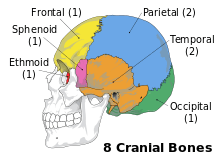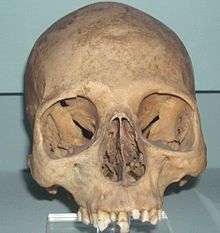cranium
English

Cranium (braincase) with the eight bones of the human cranium labelled.

Cranium (upper portion of skull) of ancient Egyptian.
Etymology
From Medieval Latin crānium (“skull”), from Ancient Greek κρανίον (kraníon, “skull”).
Pronunciation
- IPA(key): /ˈkɹeɪni.əm/
- Rhymes: -eɪniəm
Noun
cranium (plural craniums or crania)
- (anatomy) The braincase or neurocranium; that part of the skull consisting of the bones enclosing the brain, but not including the bones of the face or jaw.
- 1858, Henry Gray, Anatomy: Descriptive and Surgical, "The Skull", page 19.
- The Skull is divided into two parts, the Cranium and the Face. The Cranium is composed of eight bones; […]
- 1908, J. McFadyean, The Comparative Anatomy of the Domesticated Animals, Part I: Osteology and Arthrology, "Skeleton of Fowl", page 165.
- The cranium of the fowl is composed of the same elements as are present in the mammalian cranium, save that there is no interparietal.
- 2010, Elaine N. Marieb & Katja Hoehn, Human Anatomy and Physiology, 8th ed., Chapter 7 "The Skeleton", page 200
- The cranial bones, or cranium (kra′ne-um), enclose and protect the fragile brain and furnish attachment sites for head and neck muscles.
- 1858, Henry Gray, Anatomy: Descriptive and Surgical, "The Skull", page 19.
- (anthropology, informal) The upper portion of the skull, including the neurocranium and facial bones, but not including the jawbone (mandible).
- 2014, Emma L. Brown, Ronald A. Dixon, & Jason W. Birkett, "The Discolouration of Human Teeth from Archaeological Contexts: Elemental Analysis of a Black Tooth from a Roman Cranium Recovered from the River Witham, Lincoln, UK", Journal of Anthropology, vol. 2014, Article ID 859153, 7 pages. https://doi.org/10.1155/2014/859153.
- In this study, the cranium recovered from the River Witham in Lincoln exhibited a black metallic staining on the surfaces of the teeth.
- 2014, Emma L. Brown, Ronald A. Dixon, & Jason W. Birkett, "The Discolouration of Human Teeth from Archaeological Contexts: Elemental Analysis of a Black Tooth from a Roman Cranium Recovered from the River Witham, Lincoln, UK", Journal of Anthropology, vol. 2014, Article ID 859153, 7 pages. https://doi.org/10.1155/2014/859153.
- (informal) The skull.
Synonyms
- (anatomy): braincase, neurocranium
- (skull): skull
Holonyms
Derived terms
Derived terms
Related terms
Translations
(anatomy) braincase or neurocranium
|
skull — see skull
Latin
Etymology
Earliest attestation circa 1190. From Ancient Greek κρανίον (kraníon, “skull”).
Pronunciation
- (Classical) IPA(key): /ˈkraː.ni.um/, [ˈkraː.ni.ũ]
This article is issued from
Wiktionary.
The text is licensed under Creative
Commons - Attribution - Sharealike.
Additional terms may apply for the media files.